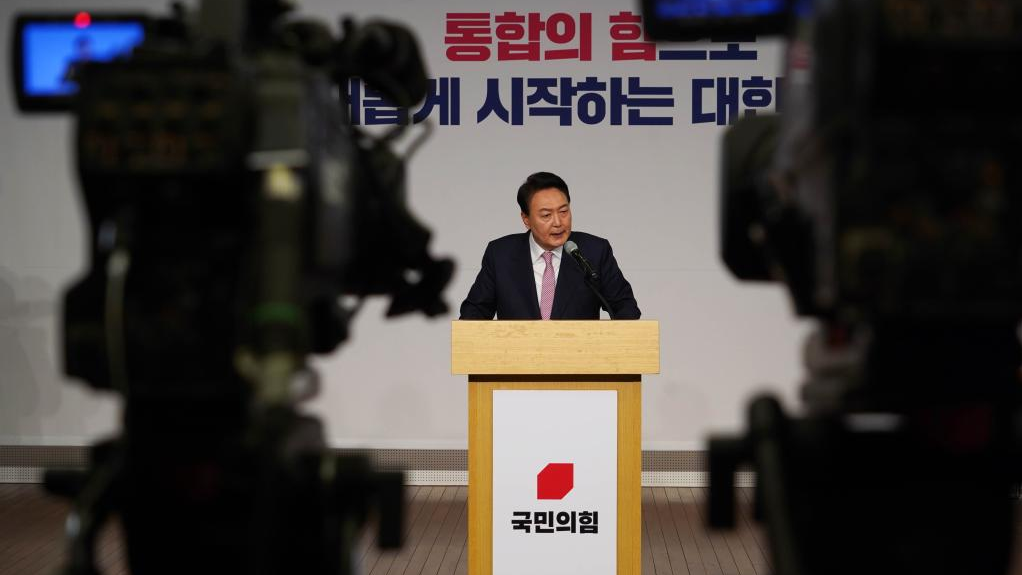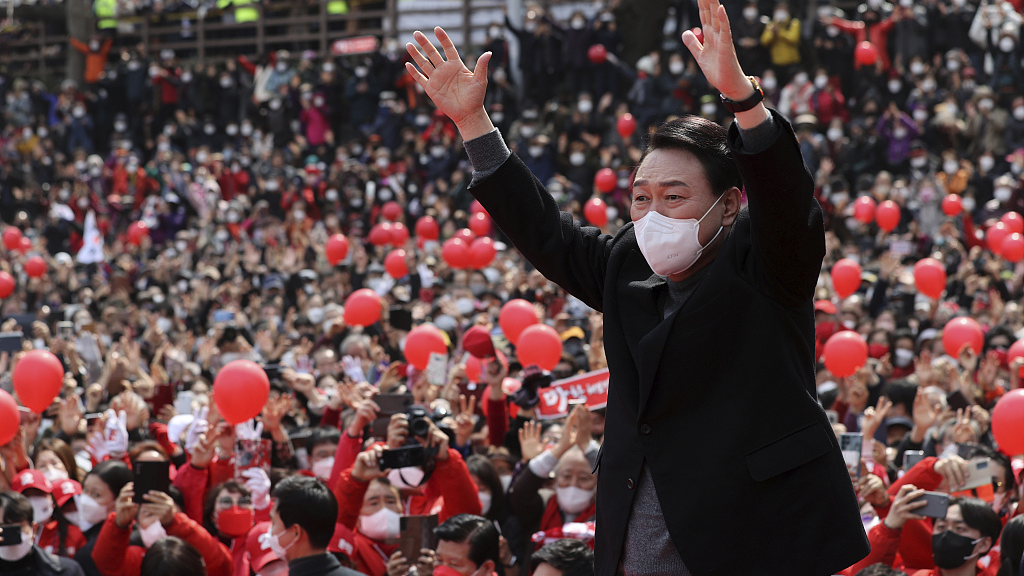
President-elect Yoon Suk-yeol speaks during a press conference at the National Assembly Library in Seoul, South Korea, March 10, 2022. /Xinhua
President-elect Yoon Suk-yeol speaks during a press conference at the National Assembly Library in Seoul, South Korea, March 10, 2022. /Xinhua
Editor's note: Freddie Reidy is a freelance writer based in London. He studied history and history of art at the University of Kent, Canterbury, specializing in Russian history and international politics. The article reflects the author's opinions, and not necessarily the views of CGTN.
Polls closed in the Republic of Korea (ROK) on March 9 with Yoon Suk-yeol of the main conservative opposition People Power Party securing the keys to the Blue House, the home and office of South Korea's head of state.
The election proved to be an acrimonious affair and became dubbed "the unlikable election" by the country's media. Both Yoon and his main rival Lee Jae-myung of the ruling Democratic Party faced a battle to prove their worthiness in overcoming a daunting democratic agenda.
While the ROK boasted a 4 percent growth of its economy in 2021, bolstered by strong exports of semiconductors, cars and ships, the recovery has been uneven, and this was a recurring theme during the election.
Yoon, a conservative, favors a big business, small government model while his liberal opponent advocated a broader more interventionist economic strategy. With the economy representing the greatest theme of the election, Yoon's 1 percent victory margin would suggest this debate is far from settled.
The nation's economic divide is between big business and medium-sized and smaller-sized businesses against a backdrop of a continued battle against COVID-19.
Central to the disparity, is the Chaebol system which prevails in the ROK. A system of large family-owned conglomerates dominates the world's 10th largest economy. Giants such as Samsung, SK Group, Hyundai and LG wield a considerable amount of economic and political influence, an influence which has often strayed into corruption.
Corporate malfeasance and economic disparity go hand in hand and arguably led to Yoon's eventual success.

Yoon Suk Yeol raises his hands during a presidential election campaign in Busan, South Korea, March 8, 2022. /VCG
Yoon Suk Yeol raises his hands during a presidential election campaign in Busan, South Korea, March 8, 2022. /VCG
In a sign of further public disdain of the political elite, Yoon's liberal rival was also outside of the political classes and rose from the trade union movement. Consequently, for the first time in South Korea's history, neither candidate had any foreign policy expertise, experience in cabinet or indeed in the legislature.
Outside of the wealth gap and corruption concerns, Yoon will have to confront other major challenges which have dogged South Korea for years, such as the dangerously low birth rate which is bearing witness to a contracting working age demographic as the country faces rapidly rising social care costs associated with an aging population.
Professor Moon Byoung-hyo of Kangwon National University told the Korea Herald that the issues of economic inequality and birth-rate are directly linked in the ROK's developed economy and must be resolved simultaneously. "It is important to reform the overall welfare and the social security system, including job instability, low wage, low quality jobs in the labor market, high housing costs, high private education costs and the burden of childbirth and childcare."
In the arena of foreign relations, Yoon's tenure is likely to be characterized by a more hawkish posture than that of his predecessor Moon Jae-in.
Presidents of the Republic of Korea are only permitted to serve one five-year term and it will be of particular disappointment to Moon that his policy of accelerated rapprochement with Pyongyang is unlikely to be pursued as the opposition leader takes over.
In a world fighting COVID-19 and rocked by global events, Yoon's presidency is likely to involve a compartmentalization policy of cooperation with the ROK's key trading partners, the U.S., Japan and China.
All three relationships have their challenges, but for Yoon, delivering on his domestic agenda of wage growth, home ownership and clamping down on corruption will hold the key to securing a majority in the nation's legislature in 2024 and thus enabling the new president to focus on his wider global ambitions.
(If you want to contribute and have specific expertise, please contact us at opinions@cgtn.com. Follow @thouse_opinions on Twitter to discover the latest commentaries in the CGTN Opinion Section.)

